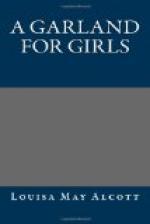“Carrie was laughing at me for liking wise books and wanting to improve my mind. Is it foolish and a waste of time?” asked Alice, eager to convince her friend and secure so powerful an ally.
“No, my dear, it is a very sensible desire, and I wish more girls had it. Only don’t be greedy, and read too much; cramming and smattering is as bad as promiscuous novel-reading, or no reading at all. Choose carefully, read intelligently, and digest thoroughly each book, and then you make it your own,” answered Mrs. Warburton, quite in her element now, for she loved to give advice, as most old ladies do.
“But how can we know what to read if we mayn’t follow our tastes?” said Carrie, trying to be interested and “intelligent” in spite of her fear that a “school-marmy” lecture was in store for her.
“Ask advice, and so cultivate a true and refined taste. I always judge people’s characters a good deal by the books they like, as well as by the company they keep; so one should be careful, for this is a pretty good test. Another is, be sure that whatever will not bear reading aloud is not fit to read to one’s self. Many young girls ignorantly or curiously take up books quite worthless, and really harmful, because under the fine writing and brilliant color lurks immorality or the false sentiment which gives wrong ideas of life and things which should be sacred. They think, perhaps, that no one knows this taste of theirs; but they are mistaken, for it shows itself in many ways, and betrays them. Attitudes, looks, careless words, and a morbid or foolishly romantic view of certain things, show plainly that the maidenly instincts are blunted, and harm done that perhaps can never be repaired.”
Mrs. Warburton kept her eyes fixed upon the tall andirons as if gravely reproving them, which was a great relief to Carrie, whose cheeks glowed as she stirred uneasily and took up a screen as if to guard them from the fire. But conscience pricked her sharply, and memory, like a traitor, recalled many a passage or scene in her favorite books which she could not have read aloud even to that old lady, though she enjoyed them in private. Nothing very bad, but false and foolish, poor food for a lively fancy and young mind to feed on, as the weariness or excitement which always followed plainly proved, since one should feel refreshed, not cloyed, with an intellectual feast.
Alice, with both elbows on the table, listened with wide-awake eyes, and Eva watched the raindrops trickle clown the pane with an intent expression, as if asking herself if she had ever done this naughty thing.
“Then there is another fault,” continued Mrs. Warburton, well knowing that her first shot had hit its mark, and anxious to be just. “Some book-loving lassies have a mania for trying to read everything, and dip into works far beyond their powers, or try too many different kinds of self-improvement at once. So they get a muddle of useless things into their heads, instead of well-assorted ideas and real knowledge. They must learn to wait and select; for each age has its proper class of books, and what is Greek to us at eighteen may be just what we need at thirty. One can get mental dyspepsia on meat and wine as well as on ice-cream and frosted cake, you know.”




